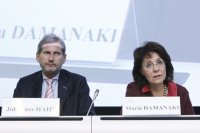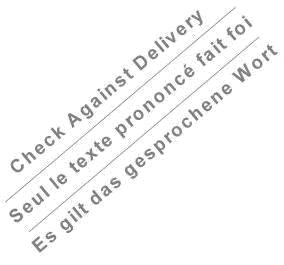Delivering Europe 2020

Open Days 2011
Brussels, 13 October 2011
In the framework of the "EU Open Days - 9th European Week of Regions and Cities" Commissioner Damanaki took part, with Commissioners Hahn and Andor and Ms. Loretta Dormal-Marino, Deputy Director-General in DG Agriculture and Rural Development of the European Commission, in a debate on the ways in which cohesion policy, and also rural development and fisheries policies, can contribute to the ‘Europe 2020’ strategy.

Good morning, colleagues, ladies and gentlemen,
These are tough times of crises. As governments try to heal their finances and people struggle to make ends meet, we have a precise duty to make our public aid efficient and to the point.
This is why we are restructuring our Funds into the Common Strategic Framework, to make them more effective and simpler to use.
I am delighted that my own portfolio is included in the Framework: this will enable us to integrate our support into a wider context and make sure that whatever funds we grant, they will be integrated with others and their effect will be maximised.
On my end, I am rationalising the existing Funds too. So far we have had different funds for fisheries policy on one hand and maritime affairs on the other. But the separation is artificial. Fisheries are part and parcel of the maritime economy and must be directly connected to other maritime industries.
Imagine for example that we want to help fishermen complement their income by diversifying into tourism: it's one fund. Or that we want to transform an industrial-looking harbour area into a small rustic fishing village offering seafood delicacies: it's the same fund.
So we are now creating one single instrument, which will be simpler to use and will make it easier to find synergies across areas.
The seas and oceans of Europe can produce food, support jobs, provide our energy, safeguard our climate and make Europe a leading economy in the world: as long as we move away from an outdated, fragmented view of the sea and invest in dynamic maritime sectors.
The Commission has had the foresight to do so. Four years ago we embarked in the maritime equivalent of the 2020 agenda by creating interconnections between maritime sectors and maritime authorities all over Europe. Now there are several concrete international projects underway; and I am sure that they will bring a significant contribution to Europe’s economic prosperity.
The ambition to meet the objectives of Europe 2020 also goes hand in hand with a review of our fisheries policy.
In the EU we urgently need to tackle a legacy of overfishing, discards and by-catch practices. Most of our stocks are overexploited. As catches decline, the industry depends more and more on subsidies for survival.
Because reform had become a necessity, I have recently launched a process of fundamental change in the fisheries domain.
We have committed to reaching good environmental status for European Seas, with fishing kept at sustainable levels, by 2020.
The forthcoming European Maritime and Fisheries Fund will enable us to make this necessary shift toward sustainability and will foster smart and inclusive growth in coastal areas.
We have foreseen fail-safe mechanisms to avoid the risk of financing unintentionally more boats, more capacity, more pollution or illegal fishing. We will only support innovative solutions with green and socially inclusive credentials.
Ladies and gentlemen,
We can no longer allow wasteful spending or perverse subsidies. From now on, money will be granted based on two things: how much good it will do to the environment and how much good it will for jobs and growth.
Thank you.


